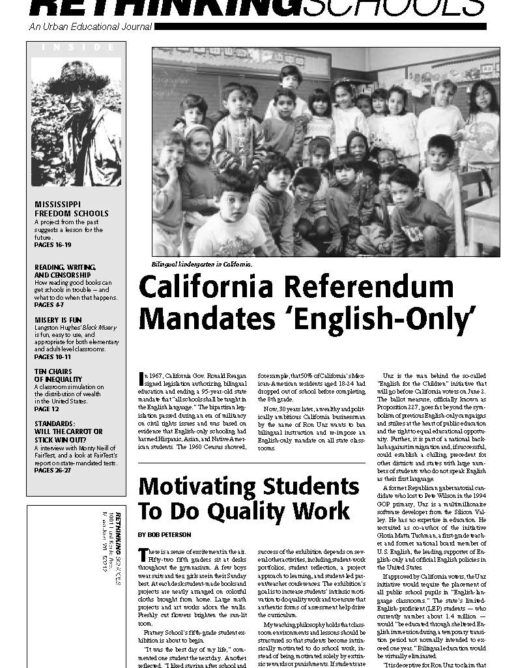Preview of Article:
Reading, Writing, and Censorship
When Reading Good Books Can Get Schools In Trouble: First of Two Articles
The American Association of School Administrators (AASA), in the book “Censorship and Selection: Issues and Answers for Schools,” defines censorship as: “[T]he removal, suppression, or restricted circulation of literary, artistic, or educational materials — of images, ideas, and information — on the grounds that these are morally or otherwise objectionable in light of standards applied by the censor.” The book, published jointly with the American Library Association (ALA), distinguishes between censorship and the ongoing, necessary reality of selecting educationally appropriate materials for the curriculum and school library. As a rule of thumb, the AASA book argues, censorship rests on an exclusion of materials, while selection involves an inclusion of materials “carried out by trained professionals, familiar with the wide variety of available choices and guided by a clear grasp of the educational purposes to be fulfilled.”
There are generally three levels of challenges to school materials, according to Deanna Duby, director of education policy for People for the American Way, a Washington D.C.-based organization opposed to censorship and other attacks on the freedom to learn in public schools.
- A parent who doesn’t want their child to read a particular book.
- A parent, teacher, administrator, or school board member who argues that no one in the class or school should read the book in dispute.
- Someone who is part of an organized campaign, whether of a local or national group, and who goes in ready for a fight and wants to make a broader political point.
The first type of challenge is often worked out at the classroom level when a teacher explains the curricular purpose of a book or how a book with profane language can still have educational merit, or offers an alternative reading assignment to a student. While there is a tendency to sometimes lump together censorship and challenges to books, teachers need to understand that any parent has the right to question the educational appropriateness of a particular book. The Bill of Rights protects not only freedom of speech but the right to petition the government for redress of grievances — and public school teachers are government employees.
Most experts on censorship argue that the line is crossed when the parent demands that no one in the class, or in the entire school, should read the book or material being challenged. Bannings spawned by an individual parent’s complaint seem to be the most common form of censorship, according to groups that track the issue.
“One of our recommendations is that if a parent or student objects to a particular book that is being read by the entire class, the student be given an alternative book,” says Charles Suhor, a representative of the National Council of Teachers of English (NCTE), who often deals with censorship issues. “If the parent still objects, they are in the position of saying they want to not only guide their child’s reading but the reading of other students. And that, we think, is censorship.”</p

